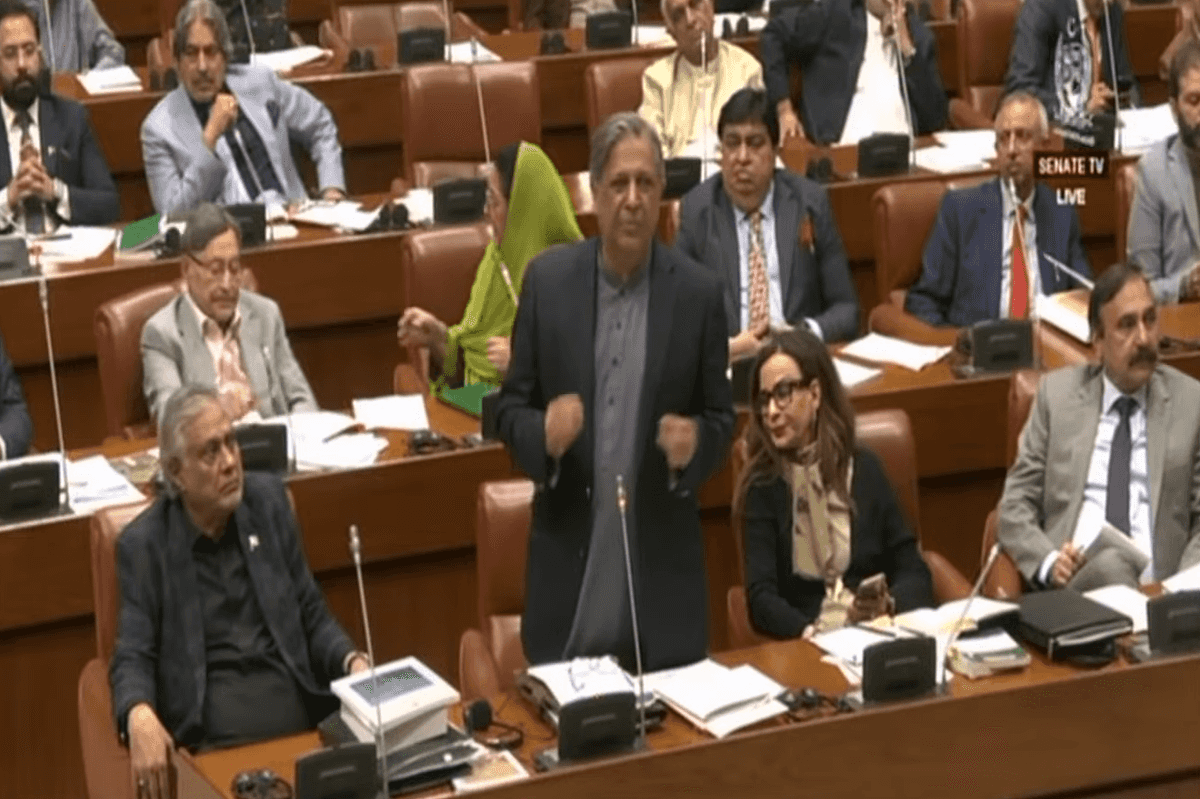Pakistan tables much-hyped constitutional amendment bill in Senate
The cabinet-approved bill has been sent to parliamentary committees on law and justice for review
Huzaifa Rathore

Law Minister Azam Nazeer Tarar speaks in the Senate on Saturday.
Senate website
Pakistan’s government on Saturday presented the 27th constitutional amendment bill in the Senate, proposing comprehensive reforms to the country’s judiciary and military structure.
The bill, approved earlier by the federal cabinet, has been referred to the Senate and National Assembly standing committees on law and justice for review.
The legislation, introduced by Law Minister Azam Nazeer Tarar, proposes the establishment of a Federal Constitutional Court (FCC), revisions to the process for appointing high court judges, adjustments to provincial cabinet thresholds and restructuring of senior military roles. Senate Chairman Yousuf Raza Gillani instructed that the committees may hold joint sessions to examine the proposal, with a report to be submitted to the House.
If approved, the amendment would modify 48 articles of Pakistan’s Constitution, representing one of the most significant reforms to the country’s governance framework in decades. Observers say the changes could alter the balance of power between the judiciary, executive, and military.
The bill has prompted debate among legal and political experts, with differing views on its potential impact on judicial independence, provincial autonomy, and civilian oversight of the armed forces. The government has stated that the reforms aim to modernize governance structures and improve federal coordination.
Government defends ‘historic judicial reforms’
Speaking in the Senate, Law Minister Tarar described the amendment as a measure to reduce the workload of the Supreme Court and ensure faster resolution of constitutional cases. “Only six percent of Supreme Court cases are constitutional, yet they consume 40 percent of its time,” he said, adding that the FCC would exclusively handle such cases.
Tarar explained that judges of the FCC, including its Chief Justice, would be constitutionally recognized, with transfers managed by the Judicial Commission of Pakistan, without involvement from the Prime Minister. He said the reforms would enhance transparency and independence in the judiciary, while also benefiting smaller provinces, such as Balochistan, by allowing the deployment of experienced judges for priority projects like Reko Diq.
The minister added that the amendment would define judicial seniority, adjust high court jurisdictions, and reinstate a two-year transfer limit previously removed under the 18th Amendment. On military reforms, Tarar clarified that appointments to the Chief of Army Staff, Chief of Defense Staff, and other senior positions would continue based on the Prime Minister’s advice, while honors such as the rank of Field Marshal could only be granted or revoked through a joint sitting of Parliament.
Tarar noted that the bill had been reviewed by coalition partners, including MQM, BAP, ANP, and the PPP’s Central Executive Committee, and that civil society groups, bar councils, and bar associations were consulted.
Opposition raises concerns over ‘rushed’ process
Opposition senators, including Ali Zafar and Raja Nasir Abbas, criticized the speed of the proceedings, arguing that major constitutional changes should not be expedited through committees. “We just received this draft and don’t even know what’s in it,” Ali Zafar said, urging a full floor debate before committee referral.
He also warned against bypassing opposition leadership, stating that debating constitutional changes without full representation could undermine parliamentary credibility. PTI senators staged a vocal protest in the chamber, while Finance Minister Ishaq Dar responded that the bill had been sent to a joint standing committee to allow all parties to present their positions. “Everyone will get a chance to present their stance; that’s what the committee is for,” Dar said.
ANP leader Aimal Wali Khan called for inclusive and transparent lawmaking, stressing that legislation should serve the people rather than individual or party agendas. He opposed measures that could reduce provincial autonomy and urged reforms that fairly balance population and geography.
The Senate formally referred the bill to the relevant standing committees, which will coordinate with the National Assembly for detailed review. Discussions are set to continue in the next session on Sunday.
Federal Constitutional Court
The amendment would create a new FCC headquartered in Islamabad, responsible for interpreting the constitution, protecting fundamental rights, and resolving disputes between the federal government and provinces.
The chief justice of the FCC would serve a three-year term, with other judges retiring at 68. The court would take over the constitutional jurisdiction currently held by Pakistan’s Supreme Court under Article 184.
Judicial reforms
The bill proposes changes to Articles 175 and 175A to establish the FCC and a revised judicial appointment process through the Judicial Commission of Pakistan, which would include both the Chief Justice of Pakistan and the Chief Justice of the FCC.
FCC rulings would be binding on subordinate courts, while Supreme Court and FCC decisions would no longer be mutually binding. The Supreme Judicial Council would be restructured to include both chief justices, with updated rules to be implemented within 60 days of enactment.
Military leadership changes – Article 243
The draft legislation would eliminate the office of the Chairman Joint Chiefs of Staff Committee, consolidating top military leadership under the serving Chief of Army Staff, who would assume the new role of Chief of Defense Forces. Officers awarded the honorary rank of Field Marshal would receive lifetime privileges. The amendment also allows the prime minister to appoint up to seven advisers and increases the number of advisers for provincial chief ministers.
Other provisions cover the structure and powers of the FCC, terminology alignment, and amendments to various constitutional articles. The FCC would also have an advisory role, providing constitutional opinions when requested by the president or parliament.
The proposed amendment comes amid ongoing discussions in Pakistan on judicial reform, separation of powers, and civil-military relations. Legal analysts note that it could redefine the country’s constitutional framework and governance practices. Passage would require a two-thirds majority in parliament and approval from provincial assemblies.







Comments
See what people are discussing